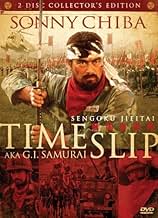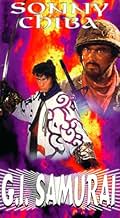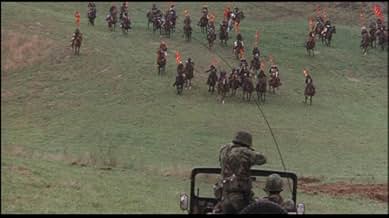AVALIAÇÃO DA IMDb
6,4/10
1,3 mil
SUA AVALIAÇÃO
Adicionar um enredo no seu idiomaJapanese soldiers time travel to feudal era. Their lieutenant allies with samurai lord to become Shogun. Both seek power through different eras' warfare.Japanese soldiers time travel to feudal era. Their lieutenant allies with samurai lord to become Shogun. Both seek power through different eras' warfare.Japanese soldiers time travel to feudal era. Their lieutenant allies with samurai lord to become Shogun. Both seek power through different eras' warfare.
- Prêmios
- 3 indicações no total
Shin'ichi Chiba
- Lt. Yoshiaki Iba
- (as Sonny Chiba)
- Direção
- Roteiristas
- Elenco e equipe completos
- Produção, bilheteria e muito mais no IMDbPro
Avaliações em destaque
Apart from controversial acting, directing, plot etc. there is one particular aspect of this movie thats is actually bad unconditionally.
If one would judge by "Sengoku Jieitai", one would conclude that JGSDF is the worst disciplined and trained army in the world, assembled by drafting idiots with criminal tendencies.
Samurai tactics against modern soldiers, shown in the movie, is remarkably decent to my surprise. It might even work IRL - well, if modern soldiers were indeed that stupid and untrained. Modern soldiers' tactics is just plain ridiculous - "WTF are they doing?!!" was all I could think about watching the otherwise spectacular final battle.
In my opinion, this movie creates a very bad image of JGSDF.
It also seems that there's not even single one positive character - anyone who's not an extra is either plain bad or just repulsive person. Even Lt. Iba (Sonny Chiba) - being badass - is also bad and an ass.
Well, at least we have two badass guys here.
If one would judge by "Sengoku Jieitai", one would conclude that JGSDF is the worst disciplined and trained army in the world, assembled by drafting idiots with criminal tendencies.
Samurai tactics against modern soldiers, shown in the movie, is remarkably decent to my surprise. It might even work IRL - well, if modern soldiers were indeed that stupid and untrained. Modern soldiers' tactics is just plain ridiculous - "WTF are they doing?!!" was all I could think about watching the otherwise spectacular final battle.
In my opinion, this movie creates a very bad image of JGSDF.
It also seems that there's not even single one positive character - anyone who's not an extra is either plain bad or just repulsive person. Even Lt. Iba (Sonny Chiba) - being badass - is also bad and an ass.
Well, at least we have two badass guys here.
"Who is Sonny Chiba? He is... he is bar none, the greatest actor working in martial arts movies today". So explains Clarence Worley in True Romance, a man who clearly knows his shizzle when it comes to Asian action stars. G.I. Samurai is the third flick I've seen from the dirt-cheap, 4-film Chiba box-set I bought from ebay, and it's the third winner in a row, a hugely entertaining sci-fi tinged action/adventure that ploughs through its 139 minutes like a 50-calibre machine gun through an army of warring-era Japanese soldiers.
Chiba plays Lt. Yoshiaki Iba, leader of a Japan Ground Self-Defense Force squadron that 'slips' through time, arriving in feudal Japan, where they join forces with a power hungry samurai planning to become the country's next ruler. The script doesn't concern itself with the whys and wherefores of the squadron's predicament, quickly glossing over the time travel nonsense in order to concentrate on the job at hand: pitting the modern-day soldiers, with their powerful weaponry, against hordes of warriors armed with swords, arrows, spears and throwing stars (oh yes, there will be ninjas!).
A couple of quieter moments do allow for that other all important staple of exploitative Japanese cinema—gratuitous female nudity—as several of Iba's men go AWOL for a rape and pillage spree, while a few others pay a visit to an obliging local widower; for the most part, however, it's loud, relentless, and bloody stuff, with Chiba proving Clarence to be right on the money with his assessment of the star: whether suspended from a helicopter firing a machine gun, riding a horse while firing a bow and arrow, or taking on a warlord with a broken sword, Sonny kicks serious ass.
Chiba plays Lt. Yoshiaki Iba, leader of a Japan Ground Self-Defense Force squadron that 'slips' through time, arriving in feudal Japan, where they join forces with a power hungry samurai planning to become the country's next ruler. The script doesn't concern itself with the whys and wherefores of the squadron's predicament, quickly glossing over the time travel nonsense in order to concentrate on the job at hand: pitting the modern-day soldiers, with their powerful weaponry, against hordes of warriors armed with swords, arrows, spears and throwing stars (oh yes, there will be ninjas!).
A couple of quieter moments do allow for that other all important staple of exploitative Japanese cinema—gratuitous female nudity—as several of Iba's men go AWOL for a rape and pillage spree, while a few others pay a visit to an obliging local widower; for the most part, however, it's loud, relentless, and bloody stuff, with Chiba proving Clarence to be right on the money with his assessment of the star: whether suspended from a helicopter firing a machine gun, riding a horse while firing a bow and arrow, or taking on a warlord with a broken sword, Sonny kicks serious ass.
Sonny Chiba delivers an excellent performance in this movie that pits modern weapons against the formidable swords and strategic brilliance of the war lords from ancient Japan. I saw this movie first as a teenager in Germany and it was shown under the title Time Slip. I searched for many years until I found it again as G.I. Samurai. I purchased the DVD which has the English dubbed version along with the original Japanese with English subtitles. The Japanese version has much more impact due to it's more authentic delivery of the dialogue. Some of the emotion and mannerism is lost in the dubbed version.
I would firstly say that somehow I remember seeing this movie in my early childhood, I couldn't read the subtitles and I thought Sonny Chiba was Sean Connery. But I did really like the concept. If you are not able to at least partially suspend your adult scepticism and embrace your inner seven your old you may want to avoid this movie. That said, having just watched the restored 137 minute version on DVD I have to say I enjoyed it, though not as much as when I was seven ( I remembered the ending ).
There are aspects of the movie that are worthy of criticism , the first 15 minutes and final 15 minutes both have some really comic moments, my favourite being the contrast between scenes acted out in the final 10 minutes and the curious choice of backing music ( listen to the lyrics ).
For an action film there is a great deal of focus on the personal stories of certain soldiers and the social dynamics of the squad as the strain of their time travel takes its toll. By the ending of the movie I had decided that this was a good thing, when seven I though the 'relationship' guff was a bad thing.
For an action film there is also plenty of gratifying gory action, especially a couple of epic battle scenes between the platoon and hordes of Shogun era warriors. The makers of the movie have ensured that as many deaths as possible are bloody and, lets face it, humorous. I thought this was a splendid aspect of the movie when I was a kid, and I am not ashamed to say that I still do.
I also like the fact that the modern day soldiers in general don't spend the movie walking on egg shells trying to avoid altering the space time continuum, they've got heavy calibre machine guns, mortars, rocket launchers, a tank and a helicopter and they're hell bent on making feudal Japan theirs. Which is what I'd like to think any vigorous IMDb user would do in their boots.
In short the movies worth watching, it makes the viewer regret that there are not more movies made with a similar premise, and at the same time offers some hefty hints as to why a movie like G.I. Samurai is so unique.
There are aspects of the movie that are worthy of criticism , the first 15 minutes and final 15 minutes both have some really comic moments, my favourite being the contrast between scenes acted out in the final 10 minutes and the curious choice of backing music ( listen to the lyrics ).
For an action film there is a great deal of focus on the personal stories of certain soldiers and the social dynamics of the squad as the strain of their time travel takes its toll. By the ending of the movie I had decided that this was a good thing, when seven I though the 'relationship' guff was a bad thing.
For an action film there is also plenty of gratifying gory action, especially a couple of epic battle scenes between the platoon and hordes of Shogun era warriors. The makers of the movie have ensured that as many deaths as possible are bloody and, lets face it, humorous. I thought this was a splendid aspect of the movie when I was a kid, and I am not ashamed to say that I still do.
I also like the fact that the modern day soldiers in general don't spend the movie walking on egg shells trying to avoid altering the space time continuum, they've got heavy calibre machine guns, mortars, rocket launchers, a tank and a helicopter and they're hell bent on making feudal Japan theirs. Which is what I'd like to think any vigorous IMDb user would do in their boots.
In short the movies worth watching, it makes the viewer regret that there are not more movies made with a similar premise, and at the same time offers some hefty hints as to why a movie like G.I. Samurai is so unique.
What if a platoon of G.I.'s from the Japanese army were to be send back in time 400 years right in the middle of the feudal wars that led to the formation of the Tokugawa Shogunate? Great pitch right? The movie does exactly what it says on the tin.
Thankfully the writers didn't bother to explain the, usually ridiculous in sci-fi movies, scientific mumbo jumbo of time transport. No how's or why's. They just did. However the time transport sequence itself is trippy as hell and quite beautiful, if not a bit dated. Not as silly as one would imagine.
The rest of the movie follows the premise to a T. But while it loses a bit of steam with the various subplots that follow the G.I.s arrival to medieval Japan, it picks up with a devastating battle sequence. Undoubtedly it's the main order of the day. The whole concept and by extension the movie itself, was probably originated from this simple pitch: what if G.I.'s equipped with the latest in modern warfare were to fight samurais? And boy does it deliver.
The main battle sequence that spans more than half an hour is probably one of THE best of its kind in 70's action/war movies. Not only is it relentless and exhausting in pace and length, it's also a terrific mish-mash of styles and techniques that only unique premises like G.I. Samurai can deliver. I mean, where else would you get the chance to feature tanks, ninjas complete with shuriikens, a helicopter and samurais in the same shot? The G.I. platoon led by lieutenant Iba tears literally through hundreds of extras, gunning them down with machine guns, mortars, grenades and tanks.
This mish-mash of styles is with one foot firmly rooted in the sprawling jidai-geki epic of Kurosawa's Kagemusha or Hiroshi Inagaki's Samurai Banners, while the other is in western action and war movies. There are stylistic touches (like the wonderful slow-motion shots and bloody violence) that bring Sam Peckinpah or Enzo G. Castellari circa Keoma to mind. Japanese cinema has always been influenced by westerns and other Hollywood works and vice versa, and G.I. Samurai effortlessly turns this east-meets-west melting pot into an exciting film.
The film-makers thankfully take the whole thing seriously and the movie benefits immensely from it. Not that tongue-in-cheek mentality is completely absent, it's just that it doesn't try to pander to so-bad-it's-good audiences that enjoy laughing at their movies. The budget was probably hefty, as it is evident in the hundreds of extras, elaborate costumes (very decent for a production that is not a traditional jidai-geki) and special effects. The camera-work and editing are all top notch, almost better than a movie with no higher artistic ambitions deserves.
It's not withouts its flaws either of course. There are many "song" scenes, where all sorts of 70's Japanese rock, disco and country songs play over montages (there's a bonding scene, a love-interest scene, a "war is hell" scene etc). The songs themselves are pretty lame and corny and detract from the whole thing. Although it clocks at a whooping 140 minutes, it flies like a bullet for the most part. Still some scenes, flashbacks and subplots in the first half could have been clipped for a tighter effect.
The cast also deserves a mention, featuring such prominent names as Sonny Chiba, Isao Natsuyagi (Goyokin, Samurai Wolf), Tsunehiko Watase (The Yakuza Papers) and Hiroyuki Sanada, all of them hitting the right notes.
Thankfully the writers didn't bother to explain the, usually ridiculous in sci-fi movies, scientific mumbo jumbo of time transport. No how's or why's. They just did. However the time transport sequence itself is trippy as hell and quite beautiful, if not a bit dated. Not as silly as one would imagine.
The rest of the movie follows the premise to a T. But while it loses a bit of steam with the various subplots that follow the G.I.s arrival to medieval Japan, it picks up with a devastating battle sequence. Undoubtedly it's the main order of the day. The whole concept and by extension the movie itself, was probably originated from this simple pitch: what if G.I.'s equipped with the latest in modern warfare were to fight samurais? And boy does it deliver.
The main battle sequence that spans more than half an hour is probably one of THE best of its kind in 70's action/war movies. Not only is it relentless and exhausting in pace and length, it's also a terrific mish-mash of styles and techniques that only unique premises like G.I. Samurai can deliver. I mean, where else would you get the chance to feature tanks, ninjas complete with shuriikens, a helicopter and samurais in the same shot? The G.I. platoon led by lieutenant Iba tears literally through hundreds of extras, gunning them down with machine guns, mortars, grenades and tanks.
This mish-mash of styles is with one foot firmly rooted in the sprawling jidai-geki epic of Kurosawa's Kagemusha or Hiroshi Inagaki's Samurai Banners, while the other is in western action and war movies. There are stylistic touches (like the wonderful slow-motion shots and bloody violence) that bring Sam Peckinpah or Enzo G. Castellari circa Keoma to mind. Japanese cinema has always been influenced by westerns and other Hollywood works and vice versa, and G.I. Samurai effortlessly turns this east-meets-west melting pot into an exciting film.
The film-makers thankfully take the whole thing seriously and the movie benefits immensely from it. Not that tongue-in-cheek mentality is completely absent, it's just that it doesn't try to pander to so-bad-it's-good audiences that enjoy laughing at their movies. The budget was probably hefty, as it is evident in the hundreds of extras, elaborate costumes (very decent for a production that is not a traditional jidai-geki) and special effects. The camera-work and editing are all top notch, almost better than a movie with no higher artistic ambitions deserves.
It's not withouts its flaws either of course. There are many "song" scenes, where all sorts of 70's Japanese rock, disco and country songs play over montages (there's a bonding scene, a love-interest scene, a "war is hell" scene etc). The songs themselves are pretty lame and corny and detract from the whole thing. Although it clocks at a whooping 140 minutes, it flies like a bullet for the most part. Still some scenes, flashbacks and subplots in the first half could have been clipped for a tighter effect.
The cast also deserves a mention, featuring such prominent names as Sonny Chiba, Isao Natsuyagi (Goyokin, Samurai Wolf), Tsunehiko Watase (The Yakuza Papers) and Hiroyuki Sanada, all of them hitting the right notes.
Você sabia?
- CuriosidadesInitially the producers approached the Japan Ground Self-Defense Force (JGSDF) for props and vehicles, but the army withdrew its support after reading that soldiers go AWOL in the script. For that reason, old and sometimes outdated equipment (like M3 sub-machine guns) had to be used. The tank featured in the movie was even built entirely from scratch.
- Erros de gravaçãoNone of the vehicles run out of fuel despite being stranded 400 years before the creation of fossil fuels for weeks.
- Versões alternativasInternational English language version has rock ballads replacing original haunting soundtrack.
Principais escolhas
Faça login para avaliar e ver a lista de recomendações personalizadas
- How long is I Want To?Fornecido pela Alexa
Detalhes
Contribua para esta página
Sugerir uma alteração ou adicionar conteúdo ausente
























